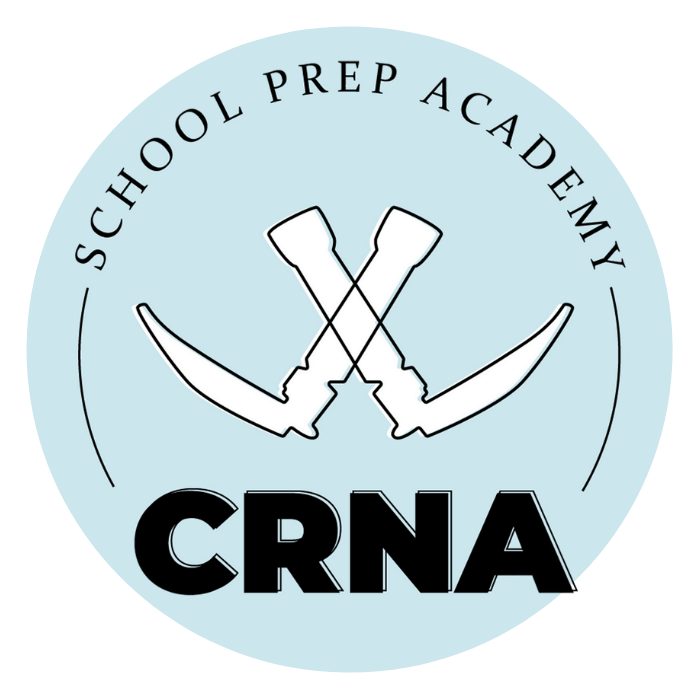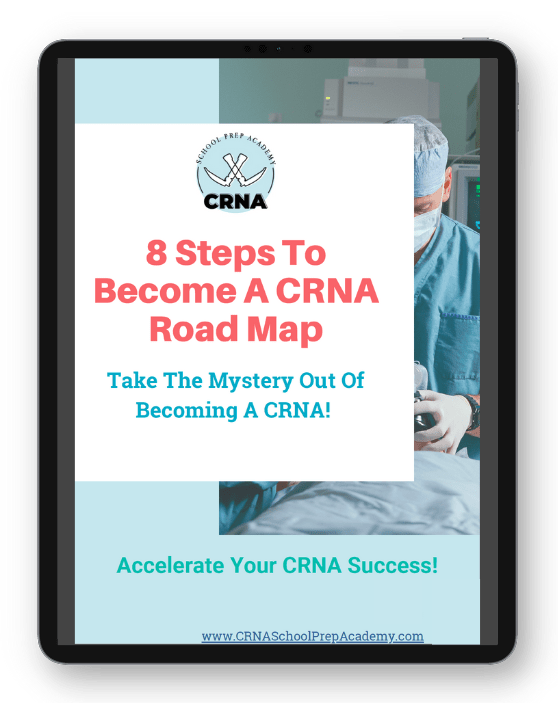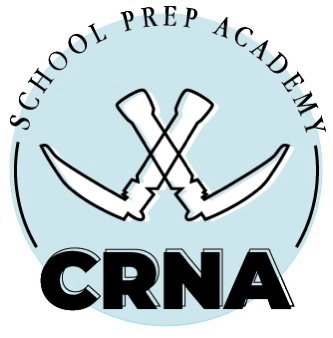Does guaranteed CRNA school acceptance sound too good to be true? Or is it something exciting that’s just right around the corner? In this episode, Jenny Finnell shares a framework that she has built that will guarantee your acceptance into CRNA school. Jenny has a CRNA guarantee program that has 26 seats available. And if you’re already a CSPA student, you’ll get first dibs. If you’re interested, be sure to click link below to learn more!
Get access to planning tools, mock interviews, valuable CRNA Faculty guidance, and mapped-out courses that have been proven to accelerate your CRNA success! Become a member of CRNA School Prep Academy here!
https://www.crnaschoolprepacademy.com/join
Book a mock interview, personal statement critique, resume review and more at https://www.TeachRN.com
Join the CSPA email list here! https://www.cspaedu.com/podcast-email
Send Jenny an email or make a podcast request!
Hello@CRNASchoolPrepAcademy.com
—
Watch the episode here
Listen to the podcast here
Guaranteed CRNA School Acceptance!
CRNA School Guarantee
Guaranteed CRNA School Acceptance. It sounds too good to be true, or is it? Something exciting that is right around the corner is that CRNA School Prep Academy is now going to be able to guarantee your acceptance into CRNA school and to any school across the country. In this episode, I’m going to share with you the framework that we have built that will guarantee your acceptance into the CRNA school. If you’re interested in learning more about our CRNA Guarantee Program, it is an application-only type of program, and we only have 26 seats. If you’re interested, be sure to go to the website to learn more. Click here to apply now: https://crnaschoolprepacademy.com/guarantee
The Golden Path
If you’re already a CSPA student, you get first dibs. Again, our cohorts are only going to be 26 students. As a current CRNA School Prep Academy member, you will get first priority to take part in this next cohort. Be on the lookout for info sent to your email. Otherwise, the official dates for this CRNA Guarantee Program, the actual cohort will start on January 16th. It is going to be a pretty quick selection process, but I hope to see you guys apply to this. Without further ado, let’s get into the framework that is going to guarantee your CRNA acceptance.
—
In this episode, we’re going to share with you the framework behind our CRNA Guarantee Program. This is exciting. I’m so thrilled to be able to launch this program. It has been in the making for quite some time, and I’m honored to be a part of your CRNA journey. All of you, every single one of you, I’m speaking to you. I’m honored to be a part of your journey. Thank you so very much for tuning in to the show. I’m going to let all the readers know that I appreciate you. Whether or not you’re a member of CSPA, I appreciate you tuning in and being a valued member of our community. Thank you.
The CRNA Guarantee Program is really exciting. I’m sure you’re asking, how does this work? How do we guarantee your CRNA school acceptance? Over the last three years that we have been running CRNA School Prep Academy, we have found the golden path of students who find the most success typically do certain things. We have essentially taken that framework and we have outlined a curriculum that we fully believe in, and that if it is done and completed, you will get into CRNA school.
So much so that it comes with a money-back guarantee. The way this framework starts and how I believe all of you should start your CRNA journey is by seeking out ideas and putting your feelers out there as far as what the career path of a CRNA entails. One of the first steps, in my opinion, to becoming a CRNA is you have to understand what that means. What does this career path look like and understand it in a sense of how would you fit into this career path? One of the first frameworks is understanding what is your why? Why do you want to become a CRNA? Why are you passionate about it?
It has to be an emotional “why”. If it’s not emotional, it’s not your “why”. I will tell you that right now. A true drive to push you toward success is something that will spur emotions within you. That is the foundation that you need to start with when starting your CRNA journey. You are also developing an understanding of what it is that you can bring to the table as a candidate. What are your strengths? What are your weaknesses? How does that play out in your role as a nurse, as a CRNA and as an applicant?
It’s understanding how to pick your school and knowing that it’s a two-way street. It goes from understanding what you bring to the table as an applicant and how you can best stand out from your competition. That’s number one. It’s knowing your why. I love to say that steps 2 through 10 would be easy if it was ten steps but essentially, the next step after the first step is essentially picking your school and not only picking the school down the road. It’s understanding why you are picking that school and getting to know that school. There is a lot that goes into this, more than just the surface level.
I think it sounds pretty surface-level, but it’s a very intimate experience when you truly get to know your school. That is something that we teach our students how to do and the right questions to ask. How to go about finding out this information that is sometimes hard to dig through and find on the internet, but it’s picking the right school for you and not just a CRNA school. Why is it the right school for you? You have to understand why it’s the right fit because it’s a two-way street. They’re picking you, but you’re equally picking them.
There are a lot of different things you have to think about other than cost and location when picking a CRNA program. The next step in the framework is understanding the strengths and weaknesses of your selections. The best way to do this is by touching base with a current student from your program, asking hard questions and understanding what the strengths again and weaknesses are of each individual choice and how that plays out in your own journey to becoming a CRNA.
I’ll tell you right now that someone’s number one school is equally someone else’s number three school. What makes it my number one and your number three? That’s the difference that you need to be able to hone in on and understand as you’re preparing your applications, and well before that. This should occur well before you’re even thinking about applying to CRNA school. You should understand these things.

Next in the framework is beefing up your ICU experience in the sense that you don’t need all the units. You don’t need CVICU. If you have PICU, you’re going to be okay. There are all these little nuances around the ICU experience, but you may have PICU experience and you may not be okay. Maybe your school does have a preference for CVICU. Those are these little things that if you find out by going to things like open houses and connecting with your programs, you’re going to be better off. It’s assessing your ICU experience and knowing whether you’re in a good place or not and not being afraid of making that big change.
Probably, one of the most painful things that I have to see students go through, other than taking things like the GRE and all these extra tests is making an ICU change because sometimes you like your ICU, but it’s not the right ICU or it’s not an ICU at all. Maybe you think you need to be well-rounded and go to them all, which is not true. I’m not saying that having different ICU experiences is bad, but if it hinders you from getting the sickest of the sickest patients, it may not be the best either.
Because typically when you’re starting off in a brand new ICU, you’re at the bottom of the barrel as far as experience goes. You’re not going to be taking the sickest of the sickest patients. You’re not going to be doing charge and precepting because you’re the new kid on the block. ICU hopping is not necessarily the best way to become a well-rounded candidate. Assessing your ICU experience and what that means for your schools and for you.
Don’t pick a unit because you think it’s what schools want. If you’re going to be miserable, go to a unit that’s going to nurture, support and give you the most opportunity for growth. It doesn’t matter if it’s a CVICU, a burn unit, or whatever it is, as long as it’s a high-acuity ICU. Again, assessing this early on is critical in your CRNA path. The program framework coaches our students on this topic pretty thoroughly.
Next, you need to have a very clear path of what your plan of action is going to be. This is a step-by-step process. You have to understand what your step-by-step process is going to be. What do you already have or what do you still need? How are you going to keep tackling little chunks to keep walking forward? I think a lot of CRNA hopefuls have this big long laundry list of things and they get frozen in that because it’s so overwhelming to look at the big picture. They have a hard time taking it in little tiny chunks.
Overcoming Obstacles
We help our students take the chunks one at a time. It makes the journeys seem more achievable, you start getting those quick wins and making some progress. Overall, you keep moving in the right direction versus staying stagnant. The next thing in the framework is understanding what your own obstacles are. There are about five obstacles that I typically see students make. Again, we teach this in our framework. It would be too long for me to go over all the obstacles in this episode but, knowing what your elephant in the room is. For some students that may be GPA. For some students, it may be either age or for some students, it may be their family.
Whatever you foresee your barrier to be, you have to understand how you’re going to get through that. How you’re going to knock that perceived barrier flat so you can walk over it? This can be a pretty big hindrance for some applicants who are otherwise incredibly great candidates. They can’t get over this obstacle that they feel is going to hold them back or going to hinder them or going to hurt them or going to make them fail or flunk out or whatever it is. Sometimes, it’s imposter syndrome.
Whatever you foresee your barrier to be, you have to understand how you're going to get through it. You have to address whatever obstacle you foresee potentially being in your way. Click To TweetYou have to address whatever obstacle you foresee potentially being in your way that even could be a mental roadblock. It doesn’t have to be something physical or something that happened. It could be a mental roadblock. It’s dealing with the five obstacles when it comes to seeking out your own CRNA journey. The next thing that we teach in our framework that makes a big difference is not just understanding the ICU experience that you need to have, but how to best utilize the ICU experience so that you become a very strong ICU nurse.
While I know time can play in your favor equally, time can play against you in this. I know that it might sound counterintuitive, but because you’ve been an ICU nurse for 15-plus to 20 years, it doesn’t mean you’re teed up for CRNA school. Sometimes what can happen over time is you can develop bad habits or good habits. You can go either way.
The key to your ICU experience is understanding how to develop the good habits that will help you flourish as an applicant, as a CRNA and as an SRNA once you’re in school. It’s understanding what are some key things you need to be doing while you’re actually in the ICU and how can you best utilize that time. What does it look like to be at the top of your game as an ICU nurse? It’s understanding that aspect of the pre-CRNA path.
Next in the framework is shifting focus a little bit and looking in on you as an applicant and starting to put those puzzle pieces together. Also, start making things like your resume and teeing it up. Making sure that’s legible, that it flows nicely and that everything’s accurate. That you use good descriptive words. It’s starting to get the foundations of your application ready and knowing what are some things that these schools would love to see highlighted.
I can’t tell you how many times I’ve run across candidates who when I meet them and I talk to them, I’m blown away by what they tell me, their stories, their passions and their whys and why they got certain awards and whatever it may be. I didn’t gather any of that from their resume because it didn’t do them any favors. Your resume and even your essay can go a long way when it comes to highlighting you. Think about this. Think about a wedding invitation. I always go to that because of something my mom said to me when we were getting married because I want to do the Sun dance or I don’t even know.
I only remember that it was cheap and it was easy. I’m like, “I’m going to send out whatever’s cheap for a wedding invitation because people just throw them in the garbage.” That’s what I said. My mom was like, “You will not do that because that’s the people’s first impression of the type of wedding you’re going to hold. I’m like, “I hadn’t thought of it like that,” but if you think about your resume and essay, that’s your first impression because these programs may not have met you in person. Although, I hope that they have because if you equally take the advice of going to program open houses and different events and things like that, you’re going to have a chance to meet these program faculty.

With that being said, your resume and essay are one of the first things in your application that are going to help you stand out amongst the crowd. You have to take them seriously. Not that you wouldn’t, but you have to make sure that you’re doing 5, 6, 7 or 8 revisions of your essay and not just three times, “I’m done.” No, it may need a lot more than that. You may need to have another set of eyes. It’s the same thing with your resume.
Again, the framework that we teach, the resume building and essentially how to write a good personal statement. The next thing that we do is that we start trying to make sure that your transcripts and your GPA’s all teed up because that’s a really big important thing. I’m going to teach you how to look over your own transcripts and make sure that there are no loopholes. Another thing is you have to equally make sure that you have any prerequisites or preferences.
Pre-req is good, but you have to thoroughly examine your transcripts in relation to what the school is expecting to see from your undergrad degree. Not all nursing schools even have you take a real chemistry course is what these schools will say. It might be an intro to chemistry. That might not count to fulfill their chemistry requirements or maybe you only have intro to chemistry and Chem 1, but they require Chem 1 and Chem 2.
You have to thoroughly look at your transcripts and understand what the school requirements are. There are so many qualified applicants who get put in the unqualified pile because of this very thing alone. This is something that I think most candidates potentially even overlook. We had someone who tested out of Math in high school. He had tested out of college math. College math was required for this CRNA program, but he assumed, and you never want to assume, that since he tested out that he equally tested out for CRNA school and that’s not the case.
He was put in a non-qualified pile. Now, this person went on to get other interviews and was accepted, but, not to the school that he originally applied to because of that very reason. He didn’t know that until it was too late. There was nothing they can do. That alone, if you knew that, and let’s just say you’re like, “I don’t want to take a math course at this point. I don’t have time to take a math course. Then you just don’t apply to that school and you save that application fee for another school.
It allows you to be smarter and work more efficiently on your application so that you give yourself the best chance. Again, our whole framework is to guarantee your acceptance. That’s why we look at all these things under our microscope because we are going to thoroughly analyze what’s going on. The next step in our framework is that we are going to help your emotional intelligence so that you can be confident, yet display that you’re a learner. We equally want you to be able to navigate difficult personalities, not just in the interview, but as you embark on your journey to become a CRNA.
Emotional Intelligence
Another aspect of the framework that we’re going to do pretty exclusively inside of the guarantee program is we’re going to work with emotional intelligence coaching through clinical scenarios and things of that nature to help you start thinking through what things sound like and look like because it’s so easy and I’m 100% guilty. No one’s born having all the emotional intelligence. I still put my foot in my mouth all the time and I’m like, “Darn it.”
Nobody is born having all the emotional intelligence they need. Click To TweetI can be awkward and I get it. Sometimes I’m like, “I don’t know if I thought that through before I said it,” but that’s just it. Once you recognize when you have moments like these, that is exactly what you need to work on, improve and do better. The only way you can do that is to be cognizant and aware of who you are and how you react to the world around you. Emotional intelligence is huge.
Programs are also heavily focusing on this because they’re realizing that emotional intelligence alone, for the most part, can make or break a cohort. A lot of programs will say, “As long as you’re teachable, I can teach you all of the science stuff,” but emotional intelligence takes time. It takes time to build that. It doesn’t happen overnight the way that teaching pathophysiology does.
These programs know that students have to have somewhat of a base of emotional intelligence prior to entering because it’s more of a slow insidious process of teaching emotional intelligence. It can and will develop but during your time in CRNA school, if you start with a good foundation, programs know automatically that you’re going to do better and be more successful in school. That is the next thing.
Preparing For The Interview
Now, we’re moving on to another big heavy hitter, which is preparing for the interview. We’re also uniquely going to be doing group mock interviews and 1-on-1 mock interviews in this CRNA guarantee program because I can’t stress enough how important the interview is. If you get an interview, getting the interview is half the battle. You have to excel in the interview and the interview can be hard.
Nerves play into it. Whether or not you got any sleep, or could sleep that is. It’s the stress; something about practicing and putting yourself intentionally in these high-stress situations through things like mock interviews is critical for you to get your jitters out and for you to practice and critique. As I said before for emotional intelligence, the only way to improve your interview skills is to do them and critique yourself, review them and try again.

It’s that awareness piece. It’s the awareness of, “I was clicking my pen. I didn’t even know I was doing it. Maybe next time I won’t even bring the pen with me or I’ll bring a non-clickable pen.” Maybe I was sitting there playing with my necklace. I shouldn’t wear a necklace. Again, critiquing yourself by reviewing the material and reviewing the feedback and knowing how to take the feedback in a way that maybe it does hurt to hear some of the things and maybe you do feel bummed out about how you performed or didn’t perform or whatever it is.
Many students that I personally have mock interviewed who did pretty poorly that took the feedback that I gave them turned around and made a successful interview out of it. It’s a matter of being open to it. I could say that most people took it that way. They took it well. I can only recall one person that I don’t think took the feedback very well and was very closed off to it. They ended up giving up on their CRNA pursuit. It goes to show that if you’re open to growing as a person and that means looking at where your weaknesses are and doing something about them, then you’re going to be successful in the pursuit of CRNA. It may not be easy. It may be a lot of work. It may stink. It may hurt. It may just outright suck, but it’s the fact that you’re willing to deal with that and do things that you don’t want to do. That’s called discipline.
If you're open to growing as a person, that means looking at where your weaknesses are and doing something about them. Click To TweetAgain, we heavily work on the preparedness of the applicant through the application process and the interview process. The interview process starts from day one. I think this is where a lot of people go wrong they wait till they get asked to interview to start preparing or they wait until they submit their application to start preparing. At that point, you’ve missed a little bit of potential great space for you to start preparing. Again, with this twelve-month program, very early on we’re doing things like preparing for the interview and it seems crazy, but I know it’s what you need to be successful.
Part of the framework is outlining the types of courses and information you need to know and makes it very clear. Also, understanding what interview style that you’re up against. You could have three different styles of interviews if you’re going to three different schools or maybe you’re interviewing at six schools. Maybe out of those six schools, two of them are very different interviews and maybe four of them are relatively similar.
Knowing that ahead of time and not focusing on the actual question, but the type of question is key in helping you prepare. I always say this even though I don’t know how many people listen to me. Even if you think it’s only EQ or personality-type questions, you need to be well-prepared for anything that could throw your way because you never know. These schools know candidates talk and maybe they just get an itch.
Maybe they get an itch that they want to ask you something a little bit clinical. Maybe because something on your resume stood out and they’re like, “I have to ask about that.” Even though typically from there, we’re going to ask all personality questions. It’s good to be prepared. I’m not saying you have to go down a giant rabbit hole and dive heavily, but doing things like studying for your CCRN or your CMC, CSC or whatever certification that you’re working on is also equally a great way to prepare for your interview on top of equally hitting emotional intelligence-type of questions and things like that.
From there, there are some outlier things with the interview. Do they do an on-the-spot essay or Casper’s test or a Math test or a CCRN-style test? This is where the school interview can be nice to know so you can do your best to prepare. If you knew you were going to have anesthesia math, you’re going to practice. It’s having that little bit of a heads-up scenario that is crucial.
I talked to another student who goes to the program I went to. They even said, “I reached out to the director prior to applying and he told me what I need to know for the interview. He outlined an entire list. For a lot of schools, it’s no secret. Some schools do keep it secret, however. Some schools have a nondisclosure agreement, but many of them will tell you pretty straight up. “This is how we interview. This is the style. These are the kinds of questions we as,” but then it’s up to you to do the homework. It’s up to you then to do the work to do well during that style of interview.
The director that gives all the study guides and things like that, his rationale is, “If they show up and they’re prepared, I know that they take initiative. I know that they’ll do the work and they’ll be similar in CRNA school. It’s a test if you think of it that way. Again, knowing this ahead of time, but the students who don’t reach out, who don’t know, who walk into a blind are going to be unprepared for the most part, especially compared to the candidates who did know. It gives you a little bit of extra edge.
The next piece of framework other than hitting home on the interview practice both individually and in a group setting, a lot of people are so turned off by a group setting because they’re nervous or they’re scared, but that’s exactly what we want because that’s exactly how you’re going to be when you’re actually in the interview. You’re going to be nervous. You’re going to feel embarrassed. You’re going to be shy. Don’t shy away from group interviews because those can be valuable and not to mention, be a fly on the wall and listen to what people say and then the critique is only going to help you.

I’ve had so many students of the CRNA School Prep Academy tell me, “I love your mock interview library. Can you please do more?” I’m like, “I am glad you love it. We have a lot in there already. We have at least six group mock interview recordings, plus an additional six actual one-on-one mock interviews. We have over twelve hours.” I think some of the group mock interviews are two hours long. There are twenty-some hours of mock interview prep, reviews, and replays.
It’s more than that because we do Q&As and everything else, but that’s a huge part of your practice is being a sponge and looking at how others did and critiquing them too and saying, “I like how they did this. I don’t like how they did this. This is how I’m going to do what I want to do.” It’s using all the tools in your toolbox. The last piece of this framework is a couple of different things. One of them is how do you move forward if you get a waitlist or how do you move forward if you get a rejection? What are the next steps from there?
If you do all the things in the framework, there’s a lot. I know I sound like I breeze through it, but within each one of those categories, there are quite a few things to do. There’s a networking piece, doing, getting and connecting with schools. There’s a certain method to that that I think if students follow, they’re going to find more success the fact that they can make a contact and get good advice from that contact. All that being said, as a community, it’s important for us to stick together.
It’s important for us to help one another. It’s important for us to support our peers when they’re down. If you get a wait list, sometimes that can feel like a big blow to the stomach like, “I’m good enough, but I’m not good enough,” or an almost yes. It’s like, “No, I’m so close. Just let me in,” but I think a lot of candidates don’t know what to do. They don’t know what the next steps are and many students get off the waitlist. A wait list in my opinion is a yes. I know it doesn’t seem like that until you after you get off of the waitlist, but it’s them saying, “We like you. We would take you if we had more seats.” That’s what a waitlist is.
How do you make it so they think of you as soon as that spot opens up on the waitlist? Most schools will not tell you the number that you’re on the waitlist. Some schools don’t even number a waitlist, but some schools do and they won’t tell you. I don’t think I’ve ever heard of a school that tells you, but maybe there is one out there. I would say, for the most part, it remains anonymous but doesn’t remain stagnant. Don’t be still. There is still plenty you can do if you get waitlisted. That rounds up the framework of how to be successful at getting into a CRNA school, a CRNA guarantee.
I hope I didn’t oversimplify what you need to do. I hope this painted a pretty picture for you and that you understand there are a lot of little steps. The unique part about it is figuring out what steps you need to take and not worrying about what your coworker’s doing because they’re different and you’re different. You should be proud of that and you should own your own path, your own experience, your own knowledge and expertise and figure out what strengths you have and what you are bringing to the table.
Timeline-wise, just do you. Do what feels good to you. While I’m all for getting ICU experience, don’t get me wrong, I equally don’t think anyone should tell you that you should have to spend at minimum three years in the ICU. If your school requires a year, then that is your timeline and that is what you want to do, make the most of it and go to CRNA school. One of my good friends and a dear colleague is an amazing CRNA, she is so good. She’s head of the block team where she works and she teaches blocks as she knows it like the back of her hand.
She only had six months of ICU experience when she applied. She had a year by the time she started the program. She’s an excellent CRNA. She’s so stinking smart. I’m not saying that’s the right thing for every person in every situation. Equally said, if you’ve been an ICU nurse for years, don’t think that you’re too late to the game. If this is your time, go. I’ve had a lot of students who say, “I had to wait until my kids were out of the house and now I have the freedom that I can go to CRNA school”. That’s amazing. Do it.
Don’t hesitate. Don’t stop. If that was your thought all along, then listen to that. Whether you want to have kids or you’re planning kids, it’s so hard to ever find the right time in life to do anything. Sometimes what you have to do is do it and figure it out. I’m not saying you should all go into CRNA school and try to all have babies, but if it happens, it happens. Make sure you have the support system and make sure you know what your priority is, which is buckling down and getting through school. Obviously, snuggling that little precious baby, but I’m only saying to make sure you have a support system so your priority, which is CRNA school can be maintained. It’s going to be hard. It’s going to be incredibly difficult, but it can be done.
Make sure you have a support system so your priority, which is CRNA school, can be maintained. It's going to be hard. It's going to be incredibly difficult. But it can be done. Click To TweetMany of my colleagues that I worked with as CRNAs, one of them in particular that I remember had her baby. It was not planned, but she had her baby in the last few months of CRNA school. I don’t think she took more than a couple of weeks off. She came back to clinical after a C-section, nonetheless. She made sure she didn’t get behind on her clinical hours so she could still sit for boards. She cried a lot. In fact, I went with her to the locker room quite often but she came back to her open heart rotation nonetheless. I can’t even imagine. I felt so bad for her. She did a great job considering how much stress and no sleep she was under.
She went on to be a CRNA and worked at this hospital. I heard her say one time where she was like, “I don’t know how I did it, but I did and I survived. It was incredibly freaking hard. She can laugh about it, probably laugh with some tears, but she did it. Be realistic with what you have going on. I’ve equally had students who need to take time off for their health. Maybe something big is going on. It’s okay. Don’t be afraid. Don’t go at it alone and even when you’re applying to CRNA school, be open with these programs about what’s going on in your life.
To get accepted, sometimes you have to take a deferral because you have to focus on your health or your family, or whatever is going on in your life. It’s okay to at least ask the question if you can take a deferral for the following year. I don’t know what made me get into that topic on this episode. I guess it’s because I see many people hesitate to even get started on this journey because they’re so fearful of the what ifs, but the what ifs are just the what ifs. You can’t take action for something that has not even happened or is not currently happening. You have to go and deal with the what-ifs as they come, if they come.
I guess I wanted to push those of you who are on the ledge of, “Should I take this massive feat and do this?” Maybe you’ve been tuning for a while and you’re like, “Ugh.” This is your time. This is your calling. The CRNA Guarantee Program. We’re going to guarantee your acceptance. It’s now or never. Get in while it’s hot. If you want to learn more about applying to the CRNA Guarantee, I hope to see you there, and I look forward to celebrating your CRNA success. Thank you so much for tuning in. As always, I appreciate you, guys. I would appreciate it if you leave the show a review.
Important Links
- CSPA Guarantee Program Application Link: https://crnaschoolprepacademy.com/guarantee
Get access to planning tools, mock interviews, valuable CRNA Faculty guidance, and mapped-out courses that have been proven to accelerate your CRNA success! Become a member of CRNA School Prep Academy: https://www.crnaschoolprepacademy.com/join
Book a mock interview, personal statement critique, resume review and more at https://www.TeachRN.com
Join the CSPA email list: https://www.cspaedu.com/podcast-email
Send Jenny an email or make a podcast request!
Hello@CRNASchoolPrepAcademy.com


